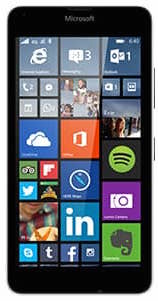
by Larry Magid
The news that Microsoft has laid off thousands of workers from its phone division and is taking a multibillion dollar write-off from its Nokia acquisition didn’t surprise me.

Although some Windows Phones have received good reviews, smartphones running the Windows Phone operating system are not jumping off the shelves. IDC estimates that Windows Phone had a 2.7 percent market share in the first quarter of 2015. That’s up from 2 percent year to year, but still a fraction of Android’s 78 percent global market share or Apple’s 18.3 percent. The only major operating system trailing Microsoft’s is BlackBerry, which has only 0.3 percent. Apple does better in the U.S. with about 41 percent market share, according to comScore, which estimated Android U.S. sales at 53.2 percent, placing U.S. Windows Phone sales at only 3.6 percent.
It’s no wonder the company announced Wednesday it was laying off 7,800 employees and taking a $ $7.6 billion write-down related to its purchase of Nokia’s phone division.
However you slice the numbers, Microsoft is not delivering on the “devices and services” strategy outlined by its former CEO Steve Ballmer, who stepped down in 2014 and was replaced by current CEO Satya Nadella. In a letter to employees, Nadella wrote “We are moving from a strategy to grow a standalone phone business to a strategy to grow and create a vibrant Windows ecosystem including our first- party device family.”
Advertisement
That leaves some room for a Microsoft-branded Windows Phone as part of the mix while shifting the focus away from devices back to Microsoft’s roots as a (mostly) PC operating and application software company. Still, given the layoffs and poor sales, my guess is that Microsoft will scale way back on its phone business and may eventually stop producing phones — at least for consumers in wealthy countries. There is some interest in Windows Phones in large enterprises and in the developing world, where Nokia once had a very strong position.
The move comes as Microsoft is getting ready to ship Windows 10 — the long-awaited replacement to the company’s beleaguered Windows 8 operating system, which has gotten a lot of bad reviews and a rather unenthusiastic response from customers.
Although Windows 10 will keep some of the more touch-friendly attributes of Windows 8, it will be better optimized for traditional desktop and laptop PCs where users are more likely to interact with their devices through keyboards and pointing devices rather than by touching the screen. And, to the relief of millions of users, Microsoft is bringing back the Start menu, which it removed in Windows 8 and halfheartedly reintroduced with Windows 8.1. Unlike the Windows 8.1 version, the new start menu will be even more robust than it was in previous versions.
And speaking of older versions of Windows, Microsoft has had a tough time retiring its previous versions. Windows 7 and Windows XP still dominate, compared to Windows 8, even though Microsoft no longer supports Windows XP and had long discouraged manufacturers from shipping new PCs with Windows 7.
It’s too early to tell if Windows 10 will turn the tide for Microsoft. The company had a terrible time with Vista, but its successor, Windows 7, did great. Perhaps the successor to Windows 8 will also do well.
In the meantime, the competition is not sitting still. Perhaps because of the halo effect of its wildly popular iPhone or maybe because people just love Macs, Apple is enjoying strong sales on its desktop and laptop lines of Macs. Apple’s Mac sales grew 8.9 percent in the first quarter of 2015, when PC sales overall fell by 1.3 percent. Gartner predicts that worldwide sales of notebooks running Google’s Chrome operating system will increase by 27 percent between 2014 and 2015. Chromebook still represent a small share, but their numbers are at least moving in the right direction.
I’m not counting Microsoft out. It’s still a strong company with popular products and services but, as founder and then CEO Bill Gates said might happen when he testified before the Senate in 1998, other companies are moving ahead. Gates was called before the Senate to answer charges that Microsoft had become a monopoly and was using its powers to unfairly dominate the operating system business.
In his testimony, Gates said “No company owns the factory for ideas,” and further pointed out that “Outside of this room … you will hear how products will replace Windows, how Java will supersede Windows, how the browser will turn into an operating system. “To the question, ‘can any Microsoft product endure future competition, anything we offer today?’ the answer is absolutely no,” he said.
Gates was right. Microsoft didn’t own the factory for ideas. Google, which wasn’t incorporated until a few months after Gates’ testimony, wound up owning the factory for search, despite Microsoft’s eventual enormous effort to compete with Bing. Apple wound up reinventing the factory for touch-screen smartphones and tablets only to be surpassed by Google’s Android in terms of global sales. And, as Google’s Chromebooks are proving, the browser is indeed turning into an operating system.
It just goes to show that no one — especially legislators — can possibly predict the future winners and losers in technology. Sure, brawn helps, but brains, imagination and nimble marketing are ultimately more important.